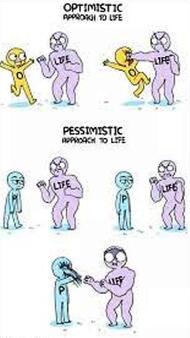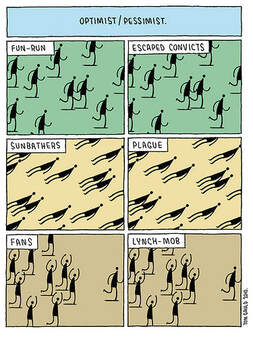
●The optimist sees the glass as half full. Good, the kids are drinking more water in this heat.
●The pessimist sees the glass as half empty. Why can’t that kid of mine understand that bottled water is expensive?
●The realist wants to know what is in the glass and the circumstances before making a judgment.
If the half full/empty glass is water, you probably won’t care and will water a plant with the remainder. If it’s orange juice, you might wonder which of the kids didn’t finish breakfast and make a mental note to be sure they all get up on time.
If the glass contains expensive champagne, you’ll most likely wonder who would put expensive champagne in a water glass, drink half, and waste the rest. You also might check the glass for lipstick.
If the clear liquid in the glass is a water with a lethal dose of poison in it, that changes everything. Who put it there? How, when, and why? If it’s half full/empty, does that mean someone has already ingested half and is now dying on the bathroom floor? How can you keep anyone from drinking the remainder? How do you preserve the scene for a police investigation?

An optimist has a natural predisposition to approach life in a positive way. Optimists believe in and are hopeful about the future and the high possibility for success; they are hopeful and expect that everything will turn out all right. And if it there are setbacks or disasters, they tend to say, “Well, it could have been a lot worse.” The expectation of success often motivates confidence and hard work, enthusiasm, fearlessness. Things are always getting better.

A pessimist has a natural predisposition to fear the worst and to have low expectations when it comes to life and particularly new experiences. Believing in the low probability of success, pessimists worry and look for the problems; they are often filled with doubts.
Pessimism can lead to a lack of confidence, including self-confidence, and a gloomy attitude about everything, but it can also fuel attention to detail, carefulness, accuracy, and preparedness. The problems never go away and things are always getting worse.

The realist accepts the circumstances as they are and prepares to deal with them accordingly. Realists approach life with the attitude it-is-what-it-is. That doesn’t mean realists don’t strive for goals or work to make things better. Basically, a realist has the natural tendency to keep the emotion out of the way and deal with what life throws at them as effectively as possible.

To the optimists, the pessimist is an unpleasant person to be around because he is always seeing problems, finding fault, and being a general buzz kill.
To the pessimists, the optimists are not being realistic; they are out of touch. Pessimists believe the optimists can’t see the actual world we live in, the injustices, the cruelty, and lack of change no matter how hard anyone tries. They are in denial and are not prepared for real life in general.
No doubt neither optimists nor pessimists approve of the realist’s approach to life.

In my opinion, that’s a little harsh. There are plenty of pessimists around who have achieved great success. As Pulitzer-prize winning political commentator George Will once put it, “The nice part about being a pessimist is that you are constantly being either proven right or pleasantly surprised.”
In fact, people use both halves of their brain equally, and creative and analytical thinking require both the left and right brain. Therefore, a person’s negative and positive outlooks are both part of the cognitive processes.
◄Illustration credit: Owl Turd Comix
Illustration source: huffpost.com/difference-optimists-pessimists-comic

PESSIMISM vs. CYNICISM
Experts contend that being a pessimist and being cynical are different, although they may express themselves in similar words and actions. While a pessimist sees the bad things in life as more prevalent than good things, someone who is cynical does not believe people can be trusted.
A fine line, to be sure, but cynicism is directed more toward human nature rather than toward mother nature and life in general. This is how differencebetween.net describes the distinction:
“● Pessimism is the belief that there are more bad things in life than there is good while cynicism is the belief that people should not be trusted. ▲ Image Source: funnyjunk.com/optimist/
● Pessimism views the world as getting worse as the years pass while cynicism views people with distrust and scorn for their motives.
● Although they are similar terms, pessimism has more negative effects on a person’s mental and emotional well-being than cynicism which has a lower degree of negativity than pessimism.
● The word “pessimism” was first used in the 1700s while “cynicism” was first used in the 1500s.
● The word “pessimism” came from the Latin word “pessimus” which means “worst” while the word “cynicism” came from the Latin word “cynicus” and the Greek word “kynikos.”

Scientists who have studied this topic tend to believe that human survival and wellness requires a balance between optimism and pessimism.
According to David Hecht [ncbi.nlm.nih.gov/pmc/articles/], “Undue pessimism makes life miserable; however, excessive optimism can lead to dangerously risky behaviors.” Further, he suggests that optimism and pessimism are differentially associated with the two cerebral hemispheres.
Without getting into a side discussion about right and left brains, l’ll just say that studies suggest that both optimism and pessimism have important roles to play in our existence, and they are simply two different but effective tactics to cope with what life throws at us. The realist part of us helps keep them in balance.
WHY DOES SOCIETY VALUE OPTIMISIM?
In 2018, the “Life Is Good” Optimism and Positivity Survey found that eighty- five percent of Americans consider themselves optimistic. That is close to the findings of other such studies, all of which were conducted before the 2020 COVID 19 pandemic.
● More of the general population are optimistic by nature and probably expect others to think the same way.
● Positive people are more pleasant to be around for extended periods of time.
● Studies suggest that optimists have better general health, improved immunological functioning, and less heart disease.
● A natural tendency to see problems instead of solutions can be exhausting, not only for the pessimist but everyone around.
But is an optimistic outlook better than a pessimistic one? Optimism seems to make people feel better about life because they believe the future will improve everything. The major advantage of a pessimism outlook is that it helps people cope with the real world more easily and to be more prepared things if they don’t get better. I think the quote from George Will summed it up nicely.
Realism is a state of general attitude perceived as being in the middle between of the two extremes with a moderate does of optimism.
COPING MECHANISMS / MANAGING STRESS
Both optimism and pessimism are methods for coping with life.
Being optimistic allows people to pursue their goals in a positive way: to dream a bigger and better dream, which they can work their way towards. Optimists also seem to respond better to positive feedback, and part of being optimistic may be generating this feedback for themselves, i.e. thinking positive thoughts.
On the other hand being pessimistic may help people reduce their natural anxiety and to perform better. Also, pessimists seem to respond better to negative feedback. They like to hear what the problems were, so they can correct them. Again, part of why pessimists generate these sorts of negative thoughts is that it helps them perform better.
Coping can be conceptualized as a mediator of the effects of optimism and pessimism on distress levels in stressful situations.
TAKE AWAY
My take away from all this is that people use both optimism and pessimism in relation to the specific situation in a manner that helps them cope most easily. There may be situations where optimism is the best response, others where pessimism is most useful.
When Margaret Hamilton was writing programs for the Apollo’s command module, someone “crashed” the simulator by accidently activating a prelaunch program while the simulator was in flight. As a result, Hamilton wanted to add error-checking code to prevent a crash under these circumstances in space, but was overruled by her NASA superiors.
This was not something that could happen in space because, Hamilton was told, “Astronauts do not make mistakes.”
Wearing her pessimist hat, Hamilton was not buying that and found a way to avert the problem. Her job was to find everything possible that could go wrong so it could be prevented in the programming, provide a warning to the astronauts, or ways to correct the problem. I’m not sure if her superiors were just optimists or arrogant male optimists, but the event does not make Hamilton a pessimist by nature.
I believe the best combination is a realist with enough pessimism to anticipate problems and be prepared, and a slight overdoes of optimism to see a brighter future.
I also agree with the scientist who points out that the “glass is always full” – half with water and half with air.
□
Resources
https://www.huffpost.com/entry/difference-optimists-pessimists-comic_n_57e550f0e4b0e80b1ba19ef4#:~:text=Optimists%20generally%20approach%20life%20with,to%20prepare%20for%20negative%20outcomes.
https://psychcentral.com/blog/pessimism-vs-optimism/
https://www.psychologytoday.com/us/collections/201108/optimism-vs-pessimism
https://www.psychologytoday.com/us/blog/your-neurochemical-self/201107/pessimists-stay-away-me?collection=69594
https://www.psychologytoday.com/us/blog/fulfillment-any-age/201011/the-trouble-optimism?collection=69594
https://www.psychologytoday.com/us/blog/your-neurochemical-self/201107/pessimists-stay-away-me?collection=69594
https://www.psychologytoday.com/us/blog/life-saving-philosophy/201107/choosing-the-glass-half-full?collection=69594
https://vancruzer.com/pessimists-vs-optimists/
https://www.nytimes.com/2020/05/01/learning/are-you-an-optimist-or-a-pessimist.html
https://ourworldindata.org/optimism-pessimism
https://liberationist.org/the-bright-and-dark-sides-of-optimism-and-pessimism/
https://stephencswan.wordpress.com/2014/05/23/optimist-or-pessimist-realist-or-something-else/
https://4enlightenment.com/2019/01/28/optimistic-vs-pessimistic/
https://www.ncbi.nlm.nih.gov/pmc/articles/PMC3807005/
https://www.ncbi.nlm.nih.gov/pmc/articles/PMC2600560/
http://www.differencebetween.net/miscellaneous/politics/ideology-politics/difference-between-pessimism-and-cynicism/
https://exploringyourmind.com/the-value-of-being-optimistic/
https://scienceinpoland.pap.pl/en/news/news%2C31632%2Cpsychologiptist-propensity-omism-more-frequent-pessimistic-tendencies.html#:~:text=Propensity%20for%20optimism%20is%20generally,that%20optimism%20can%20be%20trained.
https://www.prnewswire.com/news-releases/comprehensive-study-shows-americans-remain-optimistic-in-troubled-times-300711817.html
https://www.webmd.com/balance/news/20110916/optimism-partly-in-your-genes#1
https://smallville.com.au/see-glass-half-full-empty/
https://www.psychologytoday.com/us/blog/the-athletes-way/201908/optimism-study-gives-optimists-more-reason-be-optimistic
 RSS Feed
RSS Feed